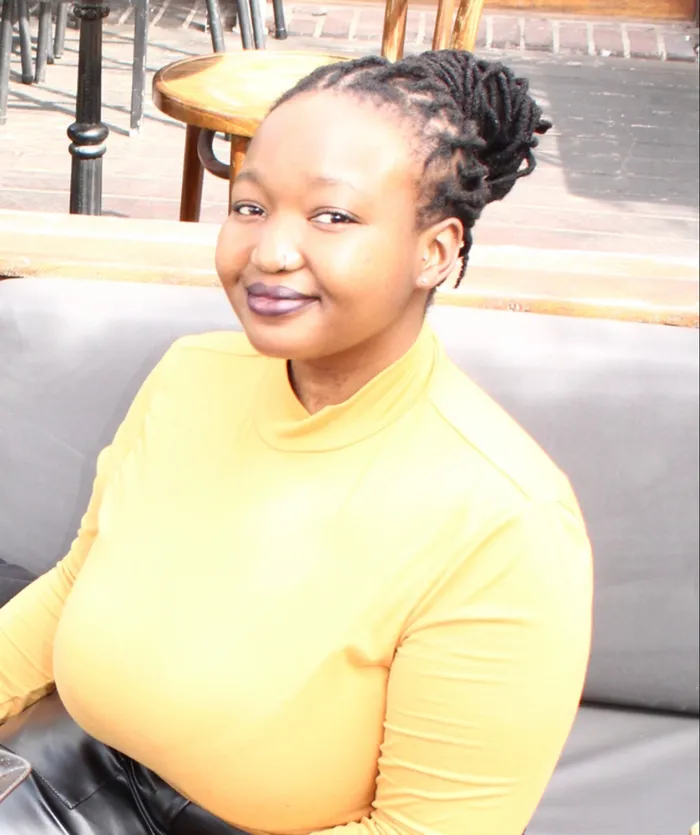We need to dismantle toxic gender relations to curb GBV

Gender activist Tswelopele Makoe.
TSWELOPELE MAKOE
Johannesburg - The gruesome discovery earlier this month of the six semi-naked bodies of murdered women in a Johannesburg panel-beating business is still a piercingly painful story.
After continuous complaints of a foul odour by employees of the business, the police were led to the hidden lifeless bodies of the six women. This is truly a chilling reminder that the advent of gender-based violence (GBV) is far from over and continues to plague our society. Violence at home, in communities, rape culture and sexual exploitation, and genital mutilation are a few in the long list of abominations that derive directly from the scourge of GBV.
The ugly head of GBV and its related atrocities in South Africa (which disproportionately affects females and the LGBTQIA+ communities) has been spotlighted heavily, especially since the Covid-19 pandemic. Social distancing rules shone a stark light on the domestic violence that takes place within the assumed “safety” of people’s own homes.
By simple or basic definition, GBV refers to the violence inflicted on someone due to their gender. GBV, in all shapes or forms, is a serious violation of fundamental human rights, and a pervasive issue, particularly in the African context. GBV stems from the expectations that arise from normative gender roles, and the perpetuation of unequal gender relations between the different genders across global societies.
Social norms concerning the roles and behaviour of sexes are key perpetrators of this type of heinous form of violence. Therefore it is important to understand GBV as not wholly created by society at large but fundamentally created by wayward individuals. For example, it’s the problematic notion that females are bound to servitude, no matter the circumstances.
It is the patriarchal idea that the desires of males are superior to those of women. In today’s context, it is an archaic, unconstitutional aberration. It is the cultural and religious beliefs and attitudes that not only side-line but also subjugate women and girls. It is the degradation and objectification of women in many platforms, including the media, and in real life in general.
These are but a few of the harmful gender norms that facilitate toxic relations between males and females. Citizens everywhere in the world have shown disapproval regarding the rampant rate of violence against women. This prevalent issue has been underscored by community leaders and national leaders alike.
South Africa has exorbitant rates of GBV. It continues to ravage our communities and more so, shows the petrifying trait of our society, that we truly live amongst monsters! The psychological impact is immeasurable, often leaving the victims unable to work and move freely. Statistics South Africa released a report stating that one in five women experienced physical violence by a partner in 2021 alone.
GBV has been a simmering nodule of our societal body for many decades. With the emergence of social media, it has been consistently highlighted and condemned. We all must understand GBV not only as it occurs, but furthermore as it permeates through our various sectors of society.

GBV stems from many societal issues and structural violence, such as socio-economically disadvantaged lived realities, frustration from lacking job opportunities, few opportunities for economic prosperity, a lack of access to resources and opportunities, inadequate guidance and healthy relations within homes, drug and alcohol abuse, and many other negative coping mechanisms that proliferate physical and sexual violence, and antagonise our children and societies simultaneously.
These inequities are entrenched into our social, economic and political systems and structures. What’s currently important is the need to highlight these forms of violence before, during and after they occur. We cannot afford to turn a blind eye to this. It is the responsibility of every single human being to ensure that they not only call out GBV but dismantle the societal notions and structures that facilitate its existence in the first place.
This is not only in educational institutions and workplaces but also in the home set-up. It is confronting toxic gender relations and ensuring that you are not perpetuating the same ideas that seek to draw deeper divisions between the sexes. Governments, citizens, and civil society will need to make a collective effort in combating gender-based violence.
Preventative measures and responsive services need to be centred throughout our societies. In our communities, it’s important to facilitate the physical and psycho-social support structures that are needed to protect victims of GBV. The facilitation of resources ought to be prioritised that will promote gender equality, assist families with desperately needed packages, and disperse information on the dangers and overall hazards of GBV.
Several GBV prevention programmes such as Thule Sana, Stepping Stones and Skhokho Supporting Success, have emerged in the South African context. Community development and upliftment are critical. Council members, traditional rulers and community leaders need to seriously undertake the commitment to “nurturing new cultures that do not tolerate GBV”, says Ijeoma Obinna-Onwuka at the Women’s Information Network.
President Cyril Ramaphosa will host the annual Presidential Summit on gender-based violence and femicide on the 1st and 2nd of November 2022. Not only leaders, but also parents and schools alike should educate children on the various types of GBV, and the programmes that educate people on preventative and reparative forums for victims.
Most importantly, as a collective society, we need to dismantle the toxic gender relations that perpetuate GBV, seriously and consistently.
Tswelopele Makoe is an MA (Ethics) student at the University of Western Cape and a Gender activist. The views expressed here are her own.
The muti side of GBV
‘Fired for being transgender’: GBV activist is furious after Delft cop shop tells her to go
We need anger because without it, we are saying GBVF is okay
Ramaphosa has failed to protect women and children – NGO
Distraught mom begs court not to grant bail to brother who allegedly raped her two-year-old daughter
Anti-GBV movement calls for the legalisation of sex work